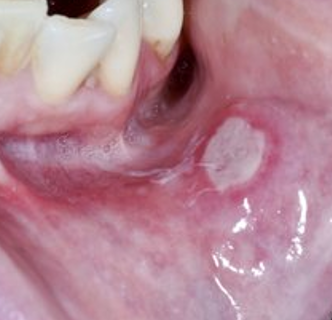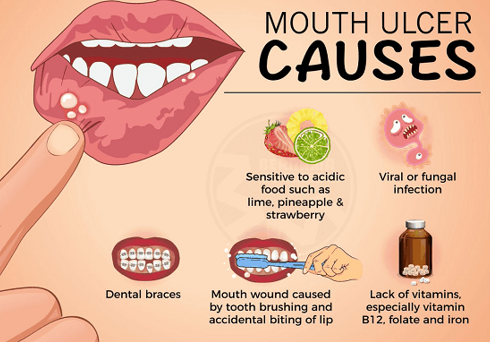Mouth Ulcers
According to NHS UK NHS UK Mouth Ulcers "Mouth ulcers are common and should clear up on their own within a week or 2".They are rarely a sign of anything serious, but may be uncomfortable to live with. You may have more than 1 ulcer at a time, and they can change in size. They are not contagious but should not be confused with cold sores which are contagious.
A pharmacist can recommend an Over The Counter (OTC) treatment to speed up healing, prevent infection or reduce pain, such as:
- Antimicrobial mouthwash
- A painkilling tablet, mouthwash, gel or spray
- Corticosteroid lozenges
- A salt (saline) mouthwash
However patients / customers should see a GP or dentist if they have a mouth ulcer that:
- Lasts longer than 3 weeks
- Keps coming back
- Grows bigger than usual
- Is near the back of their throat.
- Bleeds excessively
Causes of mouth ulcers
Most single mouth ulcers are caused by things you can try to avoid, such as:
- Biting the inside of your cheek
- Badly fitting dentures, braces, rough fillings or a sharp tooth
- Cuts or burns while eating or drinking – for example, hard food or hot drinks
- A food intolerance or allergy
- Damaging your gums with a toothbrush or irritating toothpaste
- Feeling tired, stressed or anxious
Sometimes they're triggered by things you cannot always control, such as:
- Hormonal changes – such as during pregnancy
- Your genes – some families get mouth ulcers more often
- A Vitamin B12 or iron deficiency
- Medicines – including some NSAIDs, Beta Blockers or Nicorandil
- Stopping smoking – people may develop mouth ulcers when they first stop smoking
Avoiding things that irritate the mouth ulcer should help:
- Speed up the healing process
- Reduce pain
- Reduce the chances of it returning



